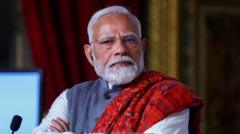Modi and Trump prepare for critical talks, balancing a warm personal relationship with pressing trade and policy demands, particularly around tariffs, energy cooperation, and technology immigration. Their discussions may also touch on sensitive geopolitical issues.
Trade Talks and Policy Challenges Shine During Modi-Trump Meeting

Trade Talks and Policy Challenges Shine During Modi-Trump Meeting
As Prime Minister Modi heads to Washington, key topics like trade, tariffs, and strategic partnerships with President Trump are set to dominate discussions amid personal camaraderie.
In a significant diplomatic encounter, Indian Prime Minister Narendra Modi is set to meet with U.S. President Donald Trump in Washington later this week, where both leaders are expected to engage in discussions laden with warmth yet underscored by a range of substantial policy challenges. Their personal rapport, characterized by a history of collaborative public appearances and aligned political visions, encapsulates a burgeoning partnership primarily focused on counterbalancing China's influence in the global arena.
Despite the congenial atmosphere, the conversation is likely to reveal the transactional nature of the U.S.-India relationship. The two leaders have evolved a nuanced understanding of each other’s priorities, shaped by the historical context of past engagements, including Modi's cabinet veterans who previously interacted with the Trump administration. As part of Modi's proactive diplomacy, India has begun implementing measures to lower tariffs and address the issue of undocumented Indian immigrants in the U.S., actions aimed at preemptively alleviating any direct demands from Trump during their discussions.
Among the key issues likely to be tabled are the persistent trade deficit and tariff reductions. The U.S.-India trade imbalance has approached $46 billion, prompting Trump to advocate for additional tariff cuts. Conversely, Modi may take this opportunity to propose bilateral negotiations on an economic partnership agreement aimed at mutually beneficial tariff reductions, tapping into a more favorable atmosphere than was present under the previous Biden administration.
Dealing with immigration will also take center stage, particularly regarding the status of undocumented Indian nationals in the U.S. Estimates suggest over 700,000 may be affected, and this sensitive topic poses significant diplomatic hurdles for Modi. India's Foreign Minister has recently reassured that measures are underway to ensure humane treatment during deportations, a point likely to be emphasized during the meeting.
Energy cooperation is another crucial area. Modi may advocate for increased U.S. oil imports while simultaneously enticing American investment in India's nuclear energy sector—a move aligned with India's ambitious renewable energy goals. This presents a balanced opportunity, offering cleaner energy alternatives while maintaining strategic economic ties.
Technological collaboration will also feature prominently, as both nations have noted burgeoning progress in this sector. Modi is expected to request assurances on the continuation of the H-1B visa program, critical for many Indian tech professionals in the U.S. This reflects the broader context of deepening technological alliances fueled by the recent Initiative on Critical and Emerging Technologies (iCET).
Beyond bilateral trade and strategic issues, geopolitical dynamics, particularly concerning Iran and ongoing conflicts in Ukraine and Gaza, may also arise. Modi's ties to Tehran via infrastructure projects reflect India's intent to enhance regional connectivity as it navigates the complexities imposed by U.S. foreign policy.
Ultimately, the meeting underscores a multifaceted relationship where both leaders hope to leverage their personal bond while navigating a landscape rich with opportunities and challenges—an effort to cement a positive tone for future collaboration amid the realities of international diplomacy.
Despite the congenial atmosphere, the conversation is likely to reveal the transactional nature of the U.S.-India relationship. The two leaders have evolved a nuanced understanding of each other’s priorities, shaped by the historical context of past engagements, including Modi's cabinet veterans who previously interacted with the Trump administration. As part of Modi's proactive diplomacy, India has begun implementing measures to lower tariffs and address the issue of undocumented Indian immigrants in the U.S., actions aimed at preemptively alleviating any direct demands from Trump during their discussions.
Among the key issues likely to be tabled are the persistent trade deficit and tariff reductions. The U.S.-India trade imbalance has approached $46 billion, prompting Trump to advocate for additional tariff cuts. Conversely, Modi may take this opportunity to propose bilateral negotiations on an economic partnership agreement aimed at mutually beneficial tariff reductions, tapping into a more favorable atmosphere than was present under the previous Biden administration.
Dealing with immigration will also take center stage, particularly regarding the status of undocumented Indian nationals in the U.S. Estimates suggest over 700,000 may be affected, and this sensitive topic poses significant diplomatic hurdles for Modi. India's Foreign Minister has recently reassured that measures are underway to ensure humane treatment during deportations, a point likely to be emphasized during the meeting.
Energy cooperation is another crucial area. Modi may advocate for increased U.S. oil imports while simultaneously enticing American investment in India's nuclear energy sector—a move aligned with India's ambitious renewable energy goals. This presents a balanced opportunity, offering cleaner energy alternatives while maintaining strategic economic ties.
Technological collaboration will also feature prominently, as both nations have noted burgeoning progress in this sector. Modi is expected to request assurances on the continuation of the H-1B visa program, critical for many Indian tech professionals in the U.S. This reflects the broader context of deepening technological alliances fueled by the recent Initiative on Critical and Emerging Technologies (iCET).
Beyond bilateral trade and strategic issues, geopolitical dynamics, particularly concerning Iran and ongoing conflicts in Ukraine and Gaza, may also arise. Modi's ties to Tehran via infrastructure projects reflect India's intent to enhance regional connectivity as it navigates the complexities imposed by U.S. foreign policy.
Ultimately, the meeting underscores a multifaceted relationship where both leaders hope to leverage their personal bond while navigating a landscape rich with opportunities and challenges—an effort to cement a positive tone for future collaboration amid the realities of international diplomacy.





















